Can mothers abandon their children?
The question of whether a mother can abandon a child has two sides: moral and legal. And if from a moral point of view such an act has never aroused approval in society, then from a legal point of view such a possibility exists, and recently it has been used more and more often.
From a legal point of view, since the term “refusal” is not used in legislation, in this case it is understood as nothing more than the will of a parent to adopt her child by other parents.
It is important to remember that until the court resolves the issue of adoption, the parents’ responsibilities for raising the child remain in full.
In other words, even if the mother decides to abandon the newborn, she cannot simply abandon him, since the abandonment procedure must be carried out in accordance with the procedure established by law.
Substitutions in maternity hospitals: what to do and how to continue living?
According to unofficial statistics, in Moscow alone there are 4 substitutions for every 10,000 births. Often the fact of child replacement remains a secret. But even when it is proven, it is not easy for affected families to protect their violated rights.
In accordance with Russian legislation, affected parents have the right to demand that the perpetrators be brought to criminal liability under Art. 153 of the Criminal Code or under Art. 293 of the Criminal Code. However, the statute of limitations for both articles is 6 and 2 years, respectively. Due to the fact that the fact of child substitution often becomes known much later, it becomes impossible to bring the perpetrators to justice under these articles.
However, this does not deprive families of the right to file a civil claim for compensation for moral damages. Unfortunately, the courts are reluctant to satisfy the claims of victims in full, despite the obvious moral suffering and life-long mistakes of the perpetrators. For example, in the regional center of Mtsensk, Oryol region, on April 6, 2009, the court made a decision in the case of child substitution to collect compensation for moral damages in the amount of 150 thousand rubles from the maternity hospital in favor of the plaintiff’s family. As compensation for the shock experienced through the fault of the doctors, the plaintiffs demanded to recover 1 million rubles from the maternity hospital. The deputy prosecutor of Mtsensk announced that the confusion in the maternity hospital was thoroughly investigated, and the guilty nurse was fired. To criminal liability under Art. 293 of the Criminal Code they could not attract her, since she was not an official. Art. 153 of the Criminal Code was also not subject to application: intent in her actions was not established. For almost two years, Russian and Chechen families did not even suspect that they were raising other people’s children. Anna sounded the alarm when her son’s maternity hospital tags accidentally caught her eye. One of them had Zarema's name on it. Anna managed to find her family, after which she offered to exchange children, but Zarema refused to believe that they were mixed up. To take her son from Zarema, Anna had to spend six months on trials and genetic examinations. The court ordered the children to be handed over to their biological parents. After a year and 8 months, the boys were returned to their real families and their documents were changed, and their names were also returned, to which they had not immediately become accustomed.
However, families do not always agree to subject their children to repeated stress and return them to their biological parents. The story of the families of Yulia and Naimat, who became victims of the negligence of maternity hospital staff, is a striking example of this. On December 17, 1998, 2 girls, Ira and Anya, were born in the maternity hospital in the city of Kopeisk (Chelyabinsk region). After 12 years, the girls’ parents found out that they were not raising their children. 4 years after her divorce from her husband Alexei, Yulia tried to collect alimony from him for her daughter Ira. In court, the ex-husband denied any relationship with the child and refused to acknowledge the claim. The court ordered the parents to undergo a DNA test, which showed that Ira is not their natural daughter. In response to her application to the prosecutor's office to initiate a criminal case, Yulia received a negative response due to the expiration of the statute of limitations, although the maternity hospital midwife, who accidentally mixed up the children 12 years ago, did not deny her guilt. However, in the maternity hospital log, the investigator managed to find the name of her roommate, whose daughter was born 15 minutes earlier. Naimat’s father received the news about the child’s replacement with suspicion, however, when he saw Ira’s photo, he immediately realized that she was his real daughter. Having met with their own children, the parents decided to tell them everything, making it as painless as possible. They explained to the girls that no one was going to change them, that now each of them had another family and sister. Now both families have filed a lawsuit in the Kopeysk City Court. Each family estimates the moral suffering caused by doctors' negligence at 5 million rubles. “At first we discussed - a million for each year of raising children, but we were told - don’t make people laugh, give at least half. This is where this amount came from. Children are 12 years old, they divided it in half, and they reduced it a little. Naturally, most likely no one will award us that much,” Yulia comments on her lawsuit. The maternity hospital believes that the public apology made to the families is enough to put an end to this story, but does not recognize the lawsuit, citing a lack of funds.
It is worth noting that when considering similar claims abroad, the courts demonstrate a generosity unknown to Russia. Thus, in Warsaw, due to a medical error when discharging children from the hospital at the age of 2 weeks, identical twins ended up in different families, and a third girl also ended up in someone else’s family. The truth was revealed 17 years later, when two very similar girls were introduced to each other by mutual friends. The similarity was not only external - even tastes and gastronomic preferences coincided. DNA analysis confirmed that they are sisters. For the substitution of children, a Polish court awarded compensation for moral damage caused to three families in the amount of 339 thousand euros for each. This compensation became the largest in the world in this category of cases.
Another case occurred in Argentina. 6 years after the birth of the children, families from the city of Concordin learned from employees of the hospital where the babies were born that their children were mixed up. Both couples went to court, demanding compensation for moral damages from unscrupulous doctors, which was estimated at 25 thousand euros. The judge considered the demands fair and was ready to satisfy them. However, he asked what the families were going to do with their children, and, having learned that they were not going to change anything, the judge reduced the amount of compensation to 2 thousand euros, considering that the suffering of the families was less severe than stated.
Unfortunately, injured parents are not always able to find their natural children. In a hospital in Kuri (Korea), upon discharge, a nurse gave someone else's baby to a woman. During a routine examination of the family, a blood test showed that the girl’s group (II) did not match the group of her parents (III). The mother's suspicions about the substitution were confirmed by DNA results. The court ruled that the maternity hospital must compensate the parents of the confused child for moral damages. The amount of compensation was 56 thousand dollars. But it was no less important for the family to find their natural daughter. The court rejected this request from the parents, citing the inviolability of the personal data of other clients of the medical institution.
Normative base
The possibility of a mother abandoning her child is provided for by the norms of the current Family Code of the Russian Federation. In particular, Article 129 of the RF IC is called: “Parental consent to the adoption of a child.” This is essentially what is meant by “refusal.” This article stipulates the procedure in which the parental will for adoption is carried out, and also establishes the mandatory conditions for it.
The possibility of voluntary abandonment of children should be distinguished from cases when the will of the parents for adoption is not required at all, which is regulated by Article 130 of the RF IC.
In addition, there are documents used when considering cases of child abandonment, in particular, Resolution of the Plenum of the Supreme Court of the Russian Federation dated November 14, 2021 No. 44 “On the practice of courts applying legislation when resolving disputes related to the protection of the rights and legitimate interests of a child in an immediate threat to his life or health, as well as in case of restriction or deprivation of parental rights.”
Child abandonment procedure
Statistics show that most mothers abandon their children in the maternity hospital, immediately after giving birth to their babies. However, there are also situations of abandonment of children at a more mature age. In this regard, many often have the question of how one can abandon a teenage child to the mother.
The main condition is that the refusal is made only if there is formalized consent to adoption from the mother.
The refusal can be issued with the participation of the guardianship and trusteeship authorities.
Circumstances that impede the maintenance and upbringing of a teenager may be inadequate conditions for living together, lack of funds, unemployment, social troubles in the family, the need for treatment in specialized conditions, and so on.
It will not be possible to formalize a mother’s abandonment of a child in all cases, but only if there are sufficient grounds for it. Otherwise, the court may refuse to deprive the mother of parental rights, and in addition, may decide on the need for proper performance of parental responsibilities.
As a rule, when mothers are deprived of parental rights, children are handed over to their fathers to raise. If this is not the case, then to other relatives. And if there are no such relatives or they do not want to take on the responsibility of raising them, the child will be transferred to an orphanage. A single mother should know this and take this into account when deciding whether to refuse.
Where to go to request a waiver
To formalize the refusal of the mother, it is necessary to contact the guardianship and trusteeship authorities at the place of residence with a corresponding application. If the children have already lived with their parents for some time, then it will not be possible to simply abandon them; you will need to prove that in this particular case there is simply no other way out.
Issues regarding deprivation of parental rights are within the competence of the judicial authorities. Accordingly, in addition to contacting the guardianship and trusteeship authorities, you will also have to go through the procedure of considering the case in court.
What documents are needed
To formalize the abandonment of children, an application for abandonment of the child by the mother is submitted to the guardianship and trusteeship authorities. In addition, the guardianship authorities will have to be convinced of the need for refusal, while providing evidence of the existence of circumstances that impede the maintenance and upbringing of the child. This can be done using the following documents:
- act of inspection of living conditions;
- certificate of low salary;
- certificate of registration as unemployed;
- certificate of registration in a psychoneurological institution;
- certificate of registration at a drug treatment facility.
These documents, together with an application for permission to adopt (an application for “refusal”), are submitted to the guardianship and trusteeship authorities. Based on their consideration, a decision is made on the possibility or impossibility of satisfying the application. The guardianship authorities, if necessary, have the right to request other documents and evidence. The final decision on depriving a mother of parental rights is made by the court.
Child abandonment lawsuit
After accepting the statement of claim, the district (city) court analyzes it for compliance with the norms of civil procedural law, including checking its content and form. Next, the judge opens the trial of the case.
It is important to know that even if at the time of filing the claim it was not possible to attach certain copies of documents, if necessary, the court can request such documents during the process. The court may also invite and question witnesses in the case, request certificates and other documentation.
If necessary, you should use your procedural rights and submit appropriate petitions to the court.
The judge checks all the arguments set out in the claim and studies all the evidence referred to by the parties.
The final stage of consideration of the case is the court's final decision.
Please note that the court hearing must be held with the participation of the adoptive parents (or adoptive parent). In addition, in order to ensure the rights and interests of children, representatives of the guardianship and trusteeship authorities and the prosecutor must take part in the process.
If the adoptee has reached the age of fourteen, then the adoption trial takes place with his participation. Failure to comply with these procedural rules entails the reversal of the court decision.
If you abandon your child, do you have to pay child support?
According to Article 71 of the RF IC, a parent who abandons a child loses all rights. Also, he cannot claim in the future for maintenance from him, he cannot claim benefits and allowances due to his parents. When a parent abandons a child, he or she loses the right of inheritance, and the child continues to be classified as an heir of the first category.
An application for relinquishment of parental rights is written with an agreement to adopt the child in the future, and in the event of his adoption, restoration of paternity is impossible. In other cases, if the parent decides to restore his rights, the procedure takes place in court with the participation of the guardianship authorities. When the child reaches 10 years of age and only with his consent.
R.TIGER specialists will help you draw up an application, contact a lawyer right now.
The provisions of family law assign rights and responsibilities to each parent.
This fact does not change in any way depending on the circumstances of the appearance of a minor in the family: adoption or the birth of a biological child.
The list of obligations is valid regardless of the fact of family members living together.
Their effect ceases only when the children reach the age of majority (gaining legal capacity upon emancipation).
As noted earlier, of the two options for leaving maternal rights, only one is voluntary - consent to adoption by third parties.
Therefore, the mother has the right to transfer her rights to the minor to his father. However, in this case there is a risk that the procedure will not be carried out according to the woman’s plan.
The court may not accept the request. The decision of the authority is influenced by several factors related to the motives that drive the mother.
These could be:
- a man entering into a second relationship when his new significant other wants to welcome a baby into the family;
- the father’s better financial position, thanks to which he is able to provide his child with everything necessary and give the latter a good education;
- the woman is addicted to alcohol or drugs and does not want her children to know about it.
The parent will face the following prohibitions:
- Impossibility of raising children.
- Inability to communicate with minors without the consent of a legal representative.
- Inability to choose an educational institution for the child and the latter’s place of residence.
- Representation of minors will be carried out only by a legal representative (in court, government agencies, and other authorities).
- Loss of the right to inherit a child's property.
- Cancellation of payments and other preferences related to the status of a parent of a minor.
The IC of the Russian Federation provides for the possibility of reinstatement of a woman’s rights, but not earlier than six months after the decision to refuse is made.
In addition, if a child is adopted by another woman, she will not be able to get her rights back. Any citizen who has reached the age of ten participates in the process.
The court takes into account the opinion of the minor as the main factor for making a decision.
The process is fully regulated by family law. Some nuances are clarified by the resolutions of the Plenum of the Supreme Court.
The latter specify the norms regarding their practical application. It is recommended to start the procedure with a visit to the O&P authority.
An employee of the structure will explain in detail the sequence of the mother’s actions and the legal consequences of their implementation.
If we talk about forced deprivation of rights, this issue is dealt with by the court located at the place of residence of the defendant (the baby’s mother). According to jurisdiction, the case is considered by district (city) authorities.
In case of voluntary refusal in favor of third parties, the document is issued to the guardianship authority located at the place of residence of the mother and child.
A sample application can be obtained directly from the court office, from a lawyer (if one is involved in the case) or on the Internet.
The rules for document execution are prescribed in Art. 129 RF IC. Adoption is allowed only with the consent of each parent to carry out the procedure.
Therefore, a mother who abandons a minor must draw up a consent in favor of the father. To do this, you need to fulfill a number of conditions:
- certify consent at a notary office (institution where the child is temporarily placed);
- confirm the permission in court.
Mother's abandonment of newborn in maternity hospital
If the mother abandoned the child in the maternity hospital, then she should document her decision, namely, in a simple written form, write an application for permission to adopt the newborn.
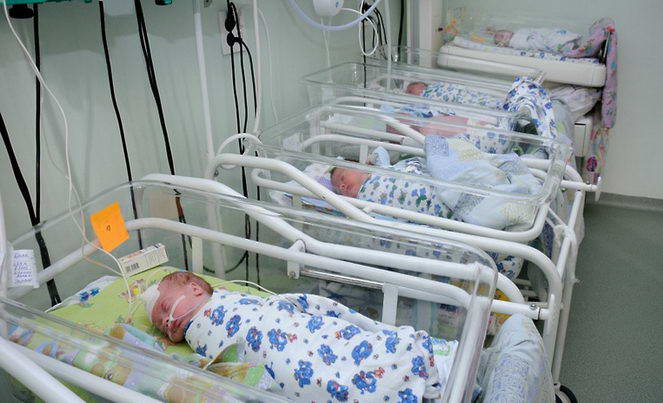
Such a statement allows the newborn to be placed in a state orphanage institution, and in addition, gives him a chance to find a new family through his subsequent adoption.
Thus, a mother’s refusal of a newborn child necessarily requires documentary recording of the will of the mother in labor. The application can be drawn up by hand, but it will need to be certified by the head physician of the maternity hospital or by a notary.
Refusal procedure
The procedure for registering a refusal involves filling out an application by the woman who gave birth to the baby using a special form. The document is drawn up in the name of the head physician of the institution where the birth took place. This statement indicates that the child will remain in the maternity hospital, and the mother is not against the baby being adopted by third parties.
It is permissible to draw up a document in written form without strict norms. There is no sample as such. In the upper right corner you should indicate the addressee's name, Mother's full name and actual address of her residence. The baby's details are also indicated. It is necessary to certify the document with the woman’s personal signature. You can rely on the sample we offer as one of the options for drawing up an application.
Read also: Public services: registration of an individual
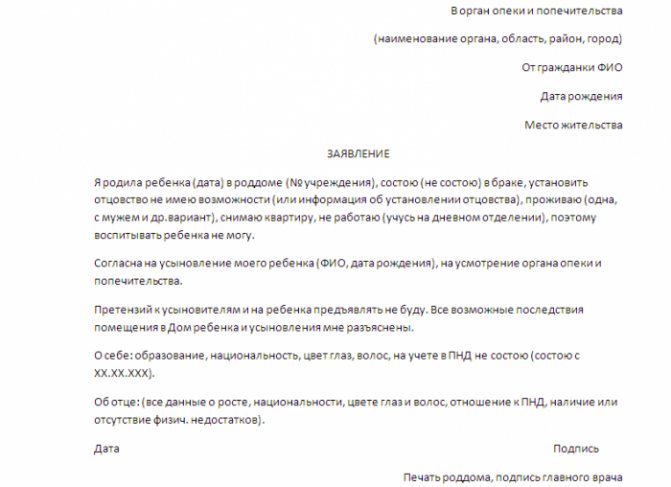
As soon as the head doctor of the institution receives such a document, he reports the situation to the guardianship and guardianship authorities. They prepare the required documentation for the court, where the woman will be deprived of parental rights. Typically, this procedure takes up to six months. Essentially, this is the time that is given to the mother to reconsider the decision she has made, perhaps to cope with the life problems that pushed her to abandon the child. In some cases, this is enough for the mother to change her mind and still take the child home. This is possible within six months from the date of application.
You need to understand that parental rights belong to both the mother and the father. Accordingly, in order to abandon a newborn, a statement from a man is required. If such a statement is not received, then education is transferred to men’s shoulders.
Worth knowing! The father of the child is also considered to be the man who divorced the woman at the time of birth, but provided that less than 300 days have passed since the divorce. In such a situation, statements are required (no sample is needed, it is drawn up in free form) both from the woman and from the ex-spouse. Likewise, if the application is not received, then the upbringing of the child is transferred to the men’s shoulders. But the statistics are disappointing. The history of refusals of sick and even healthy children says that in rare cases a man agrees to raise them independently.
In all other cases, for example, if the woman was not married or more than 300 days have passed since the divorce, then only a statement from the mother is sufficient. If a man is aware that he is a father, he can take on the upbringing of the child, becoming his legal representative, guardian or adoptive parent. The situation is similar with all other relatives of the infant. They also have the right to become the legal representatives of the baby if the mother abandoned him and was deprived of parental rights for any reason. And remember that you always have six months to change your mind and still take your baby home. Read also: Federal Tax Service personal account through State Services
Refusal in favor of the father or other relatives
If a mother, for one reason or another, abandons her baby, the question inevitably arises as to what his future fate will be. If there is a father or grandmother, then the abandonment of the child by the mother in favor of the grandmother or in favor of the father is formalized.
Thus, abandoned children get a chance to be raised by their relatives. What to do if there is no father, or neither the father nor the grandmother want to take on the responsibilities of raising him? In this case, the children are transferred to the orphanage.
Abandonment of a child who has reached the age of majority
Unlike cases of granting permission to adopt minor children, the abandonment of an adult child by the mother does not entail the need to resolve issues regarding the upbringing and maintenance of such children. Having become an adult, a son or daughter has the opportunity to decide their own destiny, including having to support themselves independently.
At the same time, in some cases, for example, when studying at a higher educational institution, the obligation to support a child for his parents does not cease upon reaching adulthood.
Consequences of failure
Regardless of whether the mother abandons her child voluntarily or is forced, the consequences will be the same. In particular, the mother will be deprived of the opportunity to take part in the further upbringing of the baby, will lose the right to claim it from other people, and will not be able to receive benefits and other benefits provided in connection with birth and upbringing.
Abandonment of children entails a complete severance of family ties with them, and accordingly, deprives a woman of the rights that she could have as a mother.
In addition, the mother will lose the right to demand her own maintenance from such children (for example, upon reaching old age or becoming incapacitated).

At the same time, the law provides that until adoption, the mother, in any case, despite the abandonment of the child, remains obligated to support him.
Mother's rights after abandoning a child
When considering the rights of a mother who has abandoned her child, it should be noted that after abandonment, the mother loses all rights in relation to her child. Since the emergence of parental rights, according to family law, is conditioned by the fact of kinship, by renouncing such kinship, the mother will lose the entire scope of rights arising from this fact of motherhood.
At the same time, according to Art. 72 of the RF IC, the mother of the child has the right to restoration of her parental rights. This is possible only in cases where the court decides that it will be better for the children, and if at the time of restoration of maternal rights such a child does not find another family.
Alimony obligations
Alimony in case of abandonment of a child by the mother is paid until the child reaches adulthood. In the case of adoption by another person, from the moment of such adoption the responsibility for maintaining the child passes to the new mother.
At the same time, the parents’ refusal leads to the fact that the child’s responsibilities for further maintenance of the father and mother who abandoned him cease. Whatever the reasons why a mother wants to give up her child, the refusal itself does not mean that you can forget about supporting the baby. If there is no desire to do this voluntarily, the issue will be resolved forcibly, by collecting alimony from the negligent parent.
Mother separated from baby and thrown out of maternity hospital in Moscow due to erroneous coronavirus test
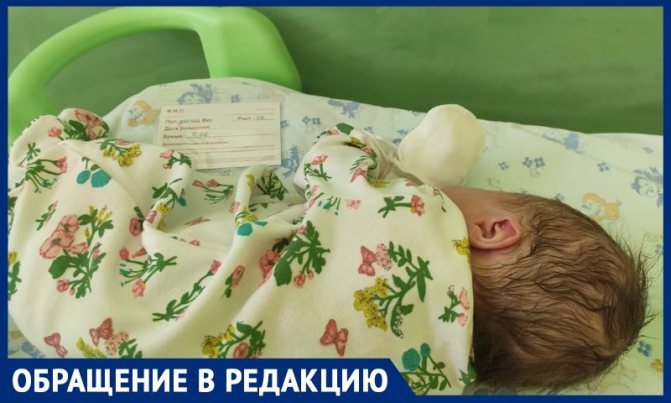
The chaos of the capital’s “anti-Covid” system knows no bounds.
Muscovite Olga N. contacted Notepad and talked about how she was separated from her newborn baby due to an erroneous coronavirus test.
On October 3, Olga, having contractions, arrived at the Moscow maternity hospital at City Clinical Hospital No. 29, where she had a contract for childbirth in the amount of 177 thousand rubles. Upon admission, Olga was swabbed for Covid, explaining that this is now a standard procedure in all maternity hospitals.
On the night of October 4, Olga and her husband had a daughter. The happy parents hoped that the mother and child would stay in the maternity hospital for the three days required by contract (and medical indications) and then be discharged and go home. The husband and relatives planned a holiday with photographs and congratulations - as it should be for discharge.
However, on the morning of October 5, the day after giving birth, the head of the department came to Olga’s ward and said that “she has bad news.” The test for coronavirus turned out to be positive, and therefore Olga must be urgently transferred to a maternity hospital for patients with COVID-19, and her newborn daughter will be sent to a children’s hospital for “Covid” patients.
Olga was literally thrown out of the hospital - she was given only one hour to get ready. In a hurry, she had an ultrasound of the uterus, which is supposed to be done only on the third day after birth, and in order to somehow justify the timing, they wrote on the certificate that the child was born not on October 4, but on the third.
Of course, Olga was in shock.
“I am an adequate person, and if they told me: “you have Covid and we are transferring you and your child to a specialized maternity hospital,” I would not even argue. But with what “joy” is a child taken away from me, whom I breastfed for a day, slept with and kissed, that is, there is no closer contact, I still don’t understand!?” - the woman is indignant.
Why should a newborn child be taken away from its mother at all? “I have not been deprived of parental rights, and no one takes away children from mothers with FLU, AIDS, and so on,” comments Olga.
With a huge scandal, after calling all authorities and communicating with the deputy chief physician, Olga managed to agree that her father could pick up her newborn daughter if she took the rapid test for coronavirus again. It is worth noting that the husband had already taken the test before giving birth - this was a mandatory condition for his presence in the hospital. His test was negative.
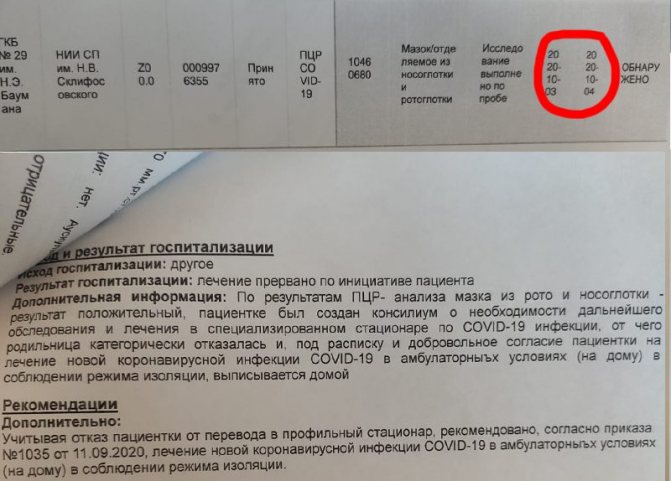
At 10 am Olga was placed in the isolation ward of the maternity hospital. At the same time, they demanded that she leave the child alone in the ward. Olga insisted that she would not leave the room until a nurse came to replace her. However, she was not allowed to breastfeed her daughter and was forced to leave, leaving the crying baby alone.
The husband was able to pick up the newborn only at 16:00.
As a result of lengthy proceedings, the hospital management offered Olga a transfer to a hospital for coronavirus patients, or treatment at home, provided that she would be separated from the child, at a different address.
Only at 6 pm Olga managed to get home. The next day she immediately took two tests in the independent laboratories CMD and KDL: PCR, as well as tests for IgG and IgM antibodies. All these tests turned out to be negative.
At the same time, it turned out that Olga was put on the wanted list, despite the fact that she provided all the addresses and told in detail where she would be after her discharge. She received calls from the district clinic, from the headquarters for the fight against coronavirus, from the children's clinic, from Rospotrebnadzor, from the Covid ambulance.
The ambulance crew began to insist on an immediate examination, despite two negative tests and a complete absence of symptoms. Olga explained several times that now the greatest threat to her is posed by doctors working with coronavirus, so she will not let them into the apartment, and she has every right to do so.
Apparently, the ambulance doctors still heard Olga’s explanations, since they never came to her.
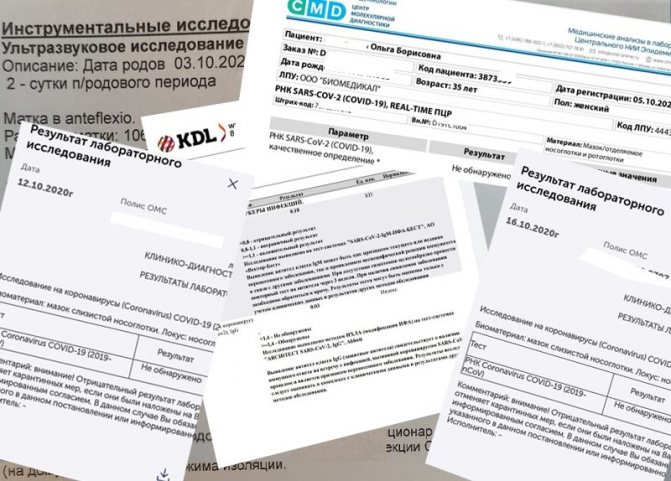
As for the newborn daughter, all these days she had to live without her mother, eating artificial milk formula, while Olga suffered from a rush of milk and incipient mastitis. Fortunately, thanks to the efforts of Olga and her husband, her daughter remained with her family. By the way, my daughter’s coronavirus test was negative: on what basis they wanted to send her to the hospital is not clear.
Despite negative tests in commercial laboratories, Olga had to undergo PCR tests twice more at the city clinic. They also did not confirm Covid, but stated that Olga would still have to quarantine for 14 days.
At the same time, from somewhere in Olga’s electronic card a second positive test for coronavirus appeared: she allegedly took tests on October 5 and 6, although testing was carried out once - on October 3.
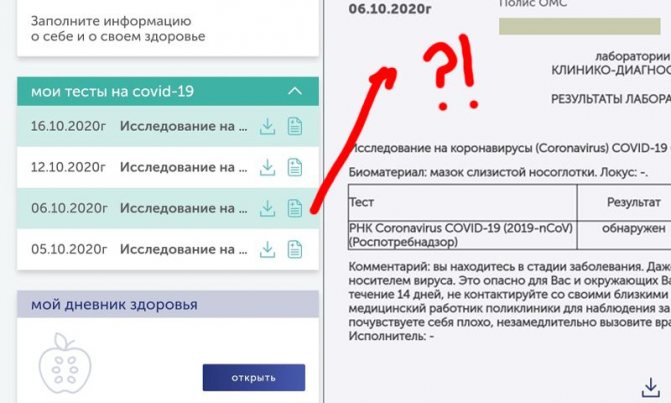
“It’s not clear where the “leftist” second positive test came from, but now it’s clear how we do statistics on Covid in our country,” states Olga.
The results of this sad story are as follows: the whole family was deprived of the happiest moment, a ceremonial discharge from the maternity hospital with flowers and memorable photographs. Together with her newborn daughter, Olga was literally “thrown out” of the maternity hospital, despite the 177,000 rubles paid.
The mother and baby were separated and deprived of the opportunity to breastfeed, and then terrorized with calls and threats.
“And what is all this for? Even by law we have a “presumption of innocence.” So why do I, a healthy person, have to prove that I am healthy, and ultimately I can’t even do that?! - Olga asks. “Everything that happened to me and my family was more like some kind of satirical performance, pure insanity!” And how long will this chaos continue???”
Olga asks to pay attention to the unscrupulous attitude towards patients in the maternity hospital at City Clinical Hospital No. 29 in Moscow, as well as to the unsettled and inhumane system for combating coronavirus, and warns all pregnant women what kind of “surprise” may await them in the capital’s maternity hospitals.
Previously, “Notepad” talked about how pregnant women in Yekaterinburg are kept in inhumane conditions due to a positive test for coronavirus: without a shower, toilet, in stuffy and cramped conditions, as well as how Muscovites “by mistake” receive tens of thousands of fines for violating quarantine rubles
If you are faced with a problem, if officials can’t hear you, if you’re feeling angry and want to complain, or vice versa - to express gratitude, congratulate or just sing a song - contact the “I want to say” section. Send your letters by email or write to @bloknot_russia on Instagram.
Alisa Belyaeva
Father's abandonment of child
Abandonment of a child by a father can be either voluntary or due to the deprivation of parental rights by the father in court. In case of voluntary refusal, the father formalizes his consent to the adoption of the child by another person. This is done at the notary by drawing up an appropriate application. Such cases are not uncommon if a woman remarries and the new husband wants to adopt children from a previous marriage.
Find out more about how a waiver of paternity is formalized.
How to correctly formalize your refusal
If a mother has firmly decided not to take part in the fate of her newborn, then she writes a corresponding statement, that is, fills out a standard refusal form, which will then be submitted to all government bodies to formalize the deprivation of parental rights.
Applications for child abandonment can be found here.
Its form is standard, filled out in 3 copies, and a sample application for child abandonment should look like this:
- On the upper right edge is written the name of the government body to which it will be sent (registry office, court and guardianship authority).
- Personal data of the parent, civil passport data, postal address of registration at the place of permanent residence.
- The refusal text must contain the actual motivation for making such a decision.
- The date of birth, first and last name of the baby are indicated.
- In the conclusion, it is necessary to state that the mother agrees to the deprivation of her rights as a parent, and agrees in advance to the possibility of adopting her baby.
- Such a statement must be notarized; this can be done by the parent herself at any notary office.
But still, she is given another six months to think about it, and if the decision changes, then she will be able to take her child under her care.
Deprivation of rights to a child
Deprivation of parental rights in court occurs if there are certain grounds, for example, if the mother cannot fulfill her parental responsibilities properly due to the fact that she leads an antisocial lifestyle, abuses drugs or alcohol, is serving sentences in prison, or simply ignores the fulfillment of parental duties. responsibilities.
Unfortunately, there are often cases when mothers simply abandon their babies in maternity hospitals. It also happens that a mother, without raising a child herself, deliberately interferes with his upbringing, and does not want to formalize a voluntary refusal, for example, in favor of the father or grandmother, and in such cases the issue of depriving her of parental rights has to be resolved through the court.
Find out more about depriving a mother of her parental rights.
Judicial practice in cases of child abandonment
When courts consider cases of parents abandoning their children and depriving them of parental rights, the judicial practice that has developed in this category of cases plays an important role.

In particular, when considering this category of cases, the courts take into account the provisions of the Resolution of the Plenum of the Supreme Court of the Russian Federation dated November 14, 2017 No. 44 “On the practice of courts applying legislation when resolving disputes related to the protection of the rights and legitimate interests of a child in the event of an immediate threat to his life or health, as well as in case of restriction or deprivation of parental rights.”
In their decisions, courts must first of all take into account the rights and interests of children, and when depriving a mother of parental rights, establish all the reasons and circumstances that prompted the woman to refuse motherhood.
To summarize, I would like to note with regret that cases of mothers abandoning their children are occurring more and more often. Of course, each such case is deeply individual and the reasons for such behavior of mothers can be very different. Such cases often traumatize not only the child’s psyche, but also leave negative marks on the psychological state of the mother. It is often incredibly difficult for a woman to make the decision to abandon her own child.
At the same time, by providing for the opportunity for a mother to write an application for permission to adopt a child, the legislation gives the child a chance to find a new family, and therefore contributes to the upbringing of a full-fledged member of society.
Consequences of mother abandoning a child: education; alimony; benefits.
Filling out a waiver form does not mean that parents are no longer obligated to participate in the baby's life.
Although there is no such law, the application can be certified by a notary. If the mother wrote this kind of document, then the state will give her time to think. If the decision does not change within 6 months, she will lose parental rights, without the possibility of appeal. If a woman in labor changes her mind after the mother has written the refusal of the child and wants to return the baby, stressful proceedings cannot be avoided, but the baby will most likely be returned. The consequences of abandoning a child are irreversible after 300 days from the date of writing the application. After the expiration of the period of 1 year, the mother who does not want to register an heir in her name is deprived of parental rights.
At this time, the baby is taken in by the father or other close relatives of the parents. The father can take custody of the child without going to court. Resolving guardianship by a relative will require time and a decision from the guardianship and trusteeship department, agreed upon with a court opinion. The mother's refusal of the child is written before the heir is registered at the registry office.
In such circumstances, the guardianship authorities are forced to fill out the form before finding living conditions suitable for the life of the newborn. The mother feeds the baby, spends time and walks with the stroller, but on the territory of the Baby House. If the decision to refuse was made with a cool head, it is proposed to act nobly towards the child and give another chance to acquire a new family. To do this, follow these steps:
- a birth certificate is issued for the baby;
- contacting a lawyer to formalize the refusal;
- it is necessary to leave the child in the maternity hospital;
- assistance to guardianship authorities. Government services will not force you to take the baby back; these formalities are necessary for future parents.
Otherwise, the baby will not have a chance to find a normal family, thereby dooming the child to lifelong orphanhood. If, after registration, the parents change their minds about taking the child, then they need to submit an application to the court for voluntary refusal and notify the registry office of the current situation.

Until the child reaches adulthood, the parents who abandoned him are required to pay monthly funds assigned by the court proceedings. From then on, the rights of the child are protected by government services. The prosecutor and representatives of the PLO will monitor the fulfillment of child support obligations until the 18th birthday.
We suggest you read: I will be released on vacation abroad or detained as a debtor
After the court accepts the waiver of parental rights, the father and mother undertake to pay child support until he has a new family. Or he won't become an adult. After adoption, the alimony process stops. If the baby is not adopted, then until his 18th birthday, the Children's Home will receive payments.
This public service is obliged to clothe, feed, teach and raise the child. All parental rights and responsibilities are transferred to them. In this case, the minimum period for alimony payments is 6 months. The longest is 18 years. The application for abandonment of the child is not approved for six months. This time is allocated to change the decision.
The court decides whether this choice was caused by the factor of reluctance to have children, or the lack of funds forces one to make such a decision. If a woman has written a refusal, and a man wants to leave an heir, then the father has all the rights to unhindered adoption. Until the biological father writes a refusal, no one has the right to adopt a child.
After 6 months, if the man has not taken action to take the baby with him, he is automatically deprived of his rights. After abandoning the child, the father's name is deleted from the certificate. Thanks to the help of lawyers, adoption becomes legally possible. Can new parents abandon their adopted child?
The RF IC does not contain a special article that would establish the possibility of voluntary termination of parental rights in relation to a child. However, sometimes a mother directly expresses her unwillingness to take care of her son or daughter for various reasons. In such a situation, a woman can initiate a procedure for deprivation of maternity.
Termination of legal relations with one’s offspring occurs in accordance with Art. 69-71 SK:
- Art. 69 lists the grounds for loss of parental status;
- Art. 70 establishes the procedural order of these actions;
- Art. 71 determines the legal consequences of the procedure.
We suggest you read: How to formalize a refusal of inheritance in favor of another person
Judicial proceedings take place in accordance with the requirements of civil procedural legislation, and the statement of claim is drawn up according to the rules of Art. 131 Code of Civil Procedure.
Unilateral renunciation of the mother's rights cannot in itself be regarded as the determining reason for the loss of parental status. In order to permanently lose legal ties with a child, an appropriate court decision is required.
Refusal can only be legalized through the mechanism of revocation of parental rights. And such a procedure, based on Part 1 of Art. 70 SK, is carried out exclusively within the framework of judicial proceedings.
A person’s written statement of intention to sever family ties with a child does not have pre-established legal force. It is necessary to go through the legalization procedure. To do this, the mother has two options:
- Contact a notary who will help you fill out an application for waiver of rights to your son or daughter;
- Become a party to proceedings for deprivation of maternity.
The legislation of the Russian Federation does not provide for the possibility of a child abandoning his mother or father. Even if the parents fail to cope with their responsibilities or do not fulfill them at all, he does not have such capabilities.
Parents cannot voluntarily renounce their rights either. However, it is permissible for a father to voluntarily renounce his rights to his son or daughter and transfer them to another person. This procedure is performed only with the approval of the mother.
This option is possible when the father does not want to pay alimony and deal with other issues related to raising his offspring, and the mother has a new marriage in which the stepfather agrees to adoption.
The opinion of a minor is taken into account when considering a court case to determine the place of residence and the procedure for communication with a parent living separately, if the minor is 10 years old.
If a child expresses that he does not want to communicate with his father or mother, the court will listen to his words, but this will not allow him to completely separate from them.
We suggest you read: Hiring a shift worker. how to draw up an employment contract on a rotational basis
If a child does not want to communicate with his parents and have any relationship with them, then the legal consequences depend on the method of refusal to communicate. If the minor at the trial refused to maintain contact with the parent when establishing a communication schedule, then the court will either refuse meetings altogether or reduce them as much as possible.
The first is possible in the presence of other aggravating circumstances: failure by the parent to fulfill responsibilities, failure to pay child support, etc. If an adult does not want to maintain a relationship with his parents, he has the right to do so. This cannot be confirmed by legal documents. Such issues are resolved at the interpersonal level.
- loss of rights to communicate with the child and participate in his life;
- transferring it to provide for relatives, the state, and then, if possible, to another family;
- lack of inheritance rights in the event of the death of a minor;
- loss of the right to claim maintenance from the child, etc.
As a result, no one can officially abandon their mother and father. There is no legal procedure that allows you to do this and obtain documentary evidence of such a decision. The final separation of a child and a parent is carried out in the event of deprivation of the latter’s rights.
If a son or daughter who has reached the age of 18 does not want to maintain a relationship with his mother or father, he can put this into practice. However, a claim of this kind will not be satisfied.
The first thing you need to know is that the term “child abandonment” as such does not exist in current family law.
This should be understood as consent to the adoption of a child by third parties. This procedure is regulated by Art. 129 IC of Russia.
In fact, such a statement can be considered a waiver of one’s rights to the minor.
Another ground for termination of maternity is the forced deprivation of rights in relation to a minor.
If a woman wishes to transfer her rights in relation to her son or daughter to a partner who is the father of a minor, then she must be guided by the provisions of the Civil Code of the Russian Federation.
In particular, we are talking about Art. 131, which approves the procedure for generating and submitting an application.
The rules for resolving the issue through litigation are specified in Art. 24 of the Civil Code of the Russian Federation.
The parent will face the following prohibitions:
- Impossibility of raising children.
- Inability to communicate with minors without the consent of a legal representative.
- Inability to choose an educational institution for the child and the latter’s place of residence.
- Representation of minors will be carried out only by a legal representative (in court, government agencies, and other authorities).
- Loss of the right to inherit a child's property.
- Cancellation of payments and other preferences related to the status of a parent of a minor.







